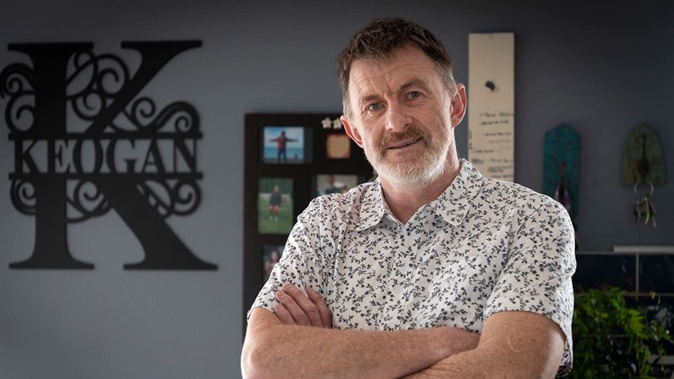
A Rotorua father who survived stage 4 bowel cancer says the eligibility age for bowel cancer screening tests should be lowered to 35 to “save a lot more lives”.
Matthew Keogan was 49 when he was diagnosed in 2021. He was told to get his affairs in order and say goodbye to his family as he might only live another three to six months.
But after chemotherapy and immunotherapy with pembrolizumab (Keytruda), he made a miraculous recovery.
Keogan told the Rotorua Daily Post this week he had not had treatment for 12 months and was in remission.
“I see it as cured.”
Keogan has joined Bowel Cancer New Zealand’s call for the Government to lower the eligibility age from 60 to 45 - a 2023 election pledge made by National’s Christopher Luxon to match Australia’s eligibility age of 45.
Bowel Cancer New Zealand has presented the Government with a “clinically backed, affordable proposal” to protect 1 million more New Zealanders by lowering the screening age to 45 for all, and to 35 for Māori and Pasifika who faced higher risk at younger ages, a Bowel Cancer NZ statement said.
A 13,000-signature supporting petition was before Parliament.
In March, Health Minister Simeon Brown announced the Government would progressively lower the age of eligibility for screening to eventually align with Australia.
The first “significant” step was lowering the age from 60 to 58, “as funding and access to additional colonoscopy resource becomes available,” Brown said at the time.
The Government scrapped plans to lower the age for Māori and Pacific people to 50, instead investing $19m to increase participation rates in those communities.
 Matthew Keogan says he has been 'cured' of his stage 4 bowel cancer after taking Keytruda. Photo / Andrew Warner
Matthew Keogan says he has been 'cured' of his stage 4 bowel cancer after taking Keytruda. Photo / Andrew Warner
Keogan, 53, said he had met a lot of people in their 30s with bowel cancer.
He said “more and more” people were being diagnosed in their 20s, 30s, and 40s, debunking the idea that cancer was “an old people’s disease”.
Keogan said he would like to see the eligibility age lowered to 45 as the Government had signalled but believed it should eventually be 35 for everyone.
“It would just stop a lot of people going through the trauma of advanced cancer.
“I know it would save a lot more lives.”
 Rotorua cancer survivor Matthew Keogan says life is back to normal. Photo / Ben Fraser
Rotorua cancer survivor Matthew Keogan says life is back to normal. Photo / Ben Fraser
Four years after his diagnosis, Keogan said life was “back to normal” - working full-time and “making memories” with family and friends.
“It’s pretty much given me a wake-up call that we’re not all indestructible.”
Keogan also wanted to raise awareness about the symptoms for bowel cancer during its awareness month, June.
The only symptom Keogan had was fatigue - other symptoms included rectal bleeding and abdominal pain.
“If you’ve got symptoms, go and get checked.”
 Bowel Cancer New Zealand chief executive Peter Huskinson. Photo / Supplied
Bowel Cancer New Zealand chief executive Peter Huskinson. Photo / Supplied
Bowel Cancer NZ chief executive Peter Huskinson said the country had one of the highest rates of bowel cancer in the world.
It was the country’s second-deadliest cancer despite 90% of cases being successfully treatable if caught early, he said.
Huskinson said 1200 people lost their lives to bowel cancer each year, including 350 people younger than 50.
New research showed early-onset bowel cancer was “on the rise”.
Huskinson said screening was a simple, cost-effective solution that saved lives “and the Government must act now”.
 Minister of Health Simeon Brown said the Government was committed to lowering the bowel cancer screening age to 45 to match Australia. Photo / Alex Burton
Minister of Health Simeon Brown said the Government was committed to lowering the bowel cancer screening age to 45 to match Australia. Photo / Alex Burton
Brown said the Government had committed to lowering the bowel cancer screening age “over time” as Health NZ increased its delivery of colonoscopies. Work was happening towards “further reductions”.
Brown said lowering the age to 58 and doing targeted campaigns for Māori and Pacific peoples would prevent 1015 colorectal cancers and save 720 lives in the next 25 years.
Initiatives for Māori and Pacific peoples included targeted promotional and engagement activities, within general practices, online educational resources, and facilities for people to return test kits, he said.
Brown said officials’ advice indicated achieving the 60% participation target for Māori and Pacific communities would prevent 244 more colorectal cancer cases and 154 deaths in 25 years compared to current participation levels. In August, officials said those were 49.1% for Māori and 38% for Pacific Peoples.
Brown said Ministry of Health advice showed Māori, Pasifika and non-Māori had “a similar chance of getting bowel cancer at any given age”.
“We are reducing screening for all New Zealanders to maximise the number of cancers we detect and the number of lives we can save.”
Bowel cancer symptoms - see a GP if experiencing:
- Bleeding from the bottom (rectal bleeding)
- Change in bowel habits that come and go over several weeks
- Persistent or sporadic abdominal pain
- Loss of weight for no obvious reason and/or feel tired and weak (symptoms of anaemia)
- Lump or swelling in the abdomen.
Source: Bowel Cancer New Zealand
Megan Wilson is a health and general news reporter for the Bay of Plenty Times and Rotorua Daily Post. She has been a journalist since 2021.
Take your Radio, Podcasts and Music with you









